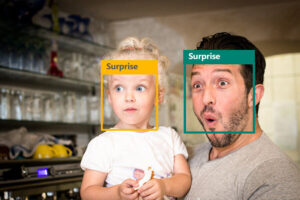AI Systems With Emotional Intelligence
Can you imagine an artificially powered machine therapist that can help understand your emotions, moods, and behaviors in all situations? The machine, that can help you virtually and recognize and interpret your emotions with the help of algorithms? A team of Microsoft is trying to achieve this goal by developing artificial intelligence-based emotional intelligence technology. This technology will provide the ability to AI systems to have a deep understanding by optimized communication and interaction with its users.
 The end goal of the “Human Understanding and Empathy” group in the company is to develop emotionally intelligent AI machines for psychology, neuroscience, human-computer interaction, linguistics, electrical engineering, and machine learning. Popular AI voice assistants technologies such as Alexa and Siri can be useful with some upgrades. To create more personalize behavior-based emotional interaction, the technology can be implemented in automobiles, shopping stores, schools, and hospitals, etc.
The end goal of the “Human Understanding and Empathy” group in the company is to develop emotionally intelligent AI machines for psychology, neuroscience, human-computer interaction, linguistics, electrical engineering, and machine learning. Popular AI voice assistants technologies such as Alexa and Siri can be useful with some upgrades. To create more personalize behavior-based emotional interaction, the technology can be implemented in automobiles, shopping stores, schools, and hospitals, etc.
“Affective Computing” is the key element of this technology that can sense, understand, and even simulate human emotions. More than a billion people suffering from mental disorders around the world and not everyone is comfortable with therapists. They are reluctant to share their emotions with most people including therapists. Emotions-based AI therapists would be a great alternative to deal with huge numbers of patients.
The Key Advantages of AI Therapists:
- Anytime available on request.
- Available for therapy sessions when the patient is comfortable for analytical deep talk.
- Can process more information collected from the patient and other resources globally, combine and analyze the potential cause behind the disorder and provide the most probable treatment.
- It won't exclude the human therapist services, instead, provide the possible solutions under the supervision of human specialists.
- In the situations like pandemics, where human-to-human contacts are avoided, telepathy is becoming a better alternative, and people feeling more comfortable with telehealth AI systems.
- Humans have specific types of behaviors that cannot be controlled and manipulated for a long time according to the conditions but machines can be updated to deal with user preferences and fluctuating emotions.
- Virtual AI therapists can have access to multiple patients at the same time without geographical limitations.
- It will also help to deal with shortages of therapists and no waiting periods for treatment. In most cases, disorders can be detected in earlier stages and easier short treatments.
- The overall cost of the treatment will be very less and most people can afford it, where ever they want and whenever they want.
The idea of virtual therapists first highlighted by MIT Professor Joseph Weizenbaum in the 1960s and but the major development happened in the recent decade. A prototype was developed and used for military counseling. The most advanced cognitive-behavioral therapy chatbot is known as Woebot that can offer service through conversations. Besides all these developments, fully AI systems with emotional intelligence are still future things. Artificial Intelligence with feelings and emotions required extensive research and development to replace human expertise in various professions.
Why Emotional Artificial Intelligence Matters By Professor Maja Pantic
Tags: Emotional AI Systems, Emotional Artificial Intelligence